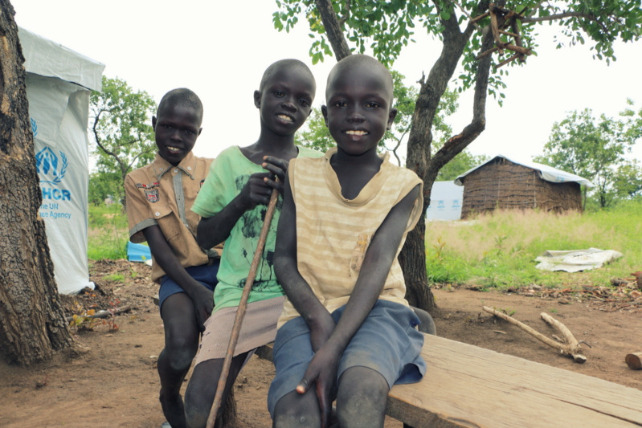How three young boys survived South Sudan’s conflict alone

James*, Stephen and David look like any three brothers. They play Tumgbali – a game involving throwing small stones in the air and catching them – together, laughing. They like to play football together, they say, and going to school.
But these three boys, just 13, 12 and 8 years old, have already been through so much. Last year they fled South Sudan after their parents were killed in the ongoing conflict, and they arrived in Uganda alone.
It was a normal December day when the boys’ parents went to work spreading cassava seeds in the bush. The children could never have imagined that was the last time they would see them alive.
While they were gone, shots could be heard being fired near where their parents were working. A neighbour went to check on them, only to find their bodies shot dead. He took the boys in and looked after them, but when the killings intensified in January this year, he refused to flee.
James, only 13 years old, believed it was the best possible chance of survival for he and his brothers, so he decided they would go alone. They packed only one small bag each, and ran.
It’s impossible to imagine how hard that decision must have been for someone so young. To take responsibility for his brothers, while still just a child himself.
Thankfully, James and his brothers are now being cared for by a foster family, thanks to the help of World Vision. Another refugee family has taken them in – an unbelievable act of generosity.
And it’s generosity that characterises the response to this refugee crisis. From the refugee families themselves, to the hard work of NGO staff – many of whom have lived in tents in the camps for months on end – to the Ugandan government.
When they arrive across the border, each family is given vaccinations, food rations and a plot of land. They're encouraged to settle, get jobs, plant food and send their kids to school, but they're free to move on if they want to. There are no restrictions. Space has even been left in the settlements for refugees who get married and start a family, so they can have land of their own.
That generosity extends further still to host communities; we heard of Ugandans asking for more refugees even though it means sharing already scarce resources.
It's the kind of radical kindness that offers hope for the future – and James can’t wait to make the world a better place; responding in kind to the generosity he’s been shown.
When he grows up, he wants to become President of South Sudan. With his smart shirt buttoned up all the way to his neck, it’s not hard to imagine.
He knows already what his first law will be: “I will tell everyone to cooperate with each other,” he says. “All people come here because of war. I want there to be no war when I become President.”
And his brothers? They’ll help him in his new role, James says. “It feels good for us to be together.”
Find out how you can support our work with refugees from South Sudan.